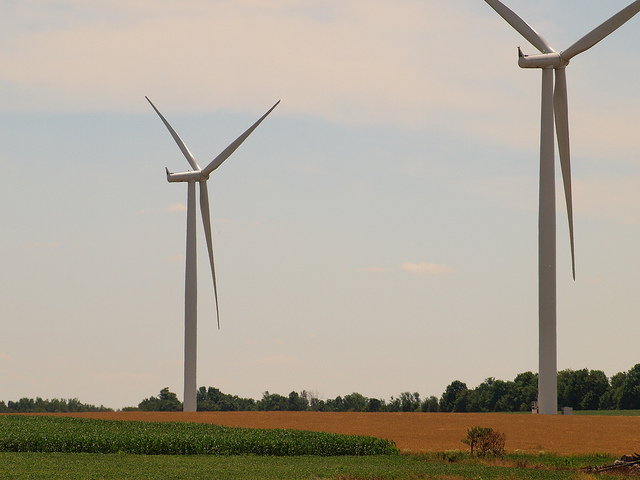There are hundreds of sustainable energy cooperative corporations in Europe, which produce, distribute and sell sustainable and renewable energy such as solar, thermal, geothermal and biomass energies as well as water, wind and tide powers among others. The corporations exist in almost all the European Union countries, some of which are integrated in REScoop.

Windmills installed in the country side, producing clean energy. Picture from Michael Gil (Flickr) (CC BY 2.0)
Rescoop stands for Renewable Energy Sources COOperative. It is a group of citizens that work together in the field of sustainable energy concentrating in developing new production, selling green energy or providing services to new initiative.
One of these associations is Ecopower, which was founded in Belgium 1991. Its objective is to raise money by selling shares and invest the capital in green energy projects. The shareholders may receive maximum of 6% of the profits on yearly basis. At the moment Ecopower has about 47,000 shareholders. The corporation sends the generated energy to Flemish electricity network and often public administrations purchase the electricity. Their energy generation is based on bio oil, wind power and solar power. The objective of the organization is not to maximize the profits but instead create added value for the society and sustainable employment.
Similar corporations can also be found in Germany. For example Windfang eG was created 1992. The society is exclusively run by women who manage the hydraulics, wind mills and sun panels for their partners.
Som Energia is another example of renewable energy corporation in Europe. The association was started in Girona (north east of Spain) 2011 and it focuses on the commercialization of the sustainable energy by investing in 100% green energy projects. Currently the society has more than 16,000 associates who have paid 100EUR each in order to have an access to web consultation and competitive energy rates.
Finally to illustrate a French case, we look into the history of Enercoop.
In 2004 this green and solidary electricity supplier was launched in France. Enercoop stands for decentralization of the energy production in the market where semi-private EDF (Électricité de France) is almost completely monopolizing the production of the energy. The sources of the green energy are hydraulics, bio gas, mini wind power and solar power. Today Enercoop has more than 11,000 private associates and 7,000 company members that benefit from the sustainable energy at competitive prices.
Another example is the Brighton Energy Cooperative, visit http://www.brightonenergy.org.uk/ to know more